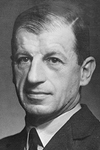Our War Leaders in Peacetime - Portal
The War Illustrated, Volume 10, No. 247, Page 535, December 6, 1946.
As chief of the wartime R.A.F., Charles Frederick Algernon Portal earned a name for determination, a quick-thinking brain and a deep interest in aviation matters. Hit juniors knew he had been a first-class cricketer: what they did not know was that their chief has been a student of flight ever since, as a boy of 16, at Winchester, he trained his first falcon.
He is the only top-rating Allied war-leader to “fly hawks”. Before the war, when he had time for falconry, near his Hungerford home, the 4,000-years old sport was one of his relaxations. He is a foremost authority on this “sport of kings” and did not lose interest in it even during the war.
Marshal of the R.A.F. Viscount Portal of Hungerford, G.C.B., O.M., D.S.O., M.C., born at Pangbourne, Berks, in 1893, is of Huguenot stock; his ancestors are said to have crossed the Channel hidden in empty casks among a shipment of wine. A swarthy young man with the “Huguenot nose”, he married Joan Margaret, the daughter of Sir Charles Glynn Welby, in 1919, and if she did not ride a motor-cycle at breakneck speed (a craze of his) she has shared his other interests, over a wide field, for 27 years.
He's Never Still for a Moment
When an undergraduate he won the 1914 Inter-Varsity Motor Cycle Hill Climb, and he took up flying because it is faster than motor-cycling. By way of contract, three years ago he bought a camera and became so interested that he embarked upon micro-photography. Long ago Portal added fishing and sailing to his other outdoor sports, and promptly Lady Portal and the two Portal girls, Rosemary Ann, born in 1923, and Mavis Elizabeth Alouette, born in 1926, became enthusiasts. A first-class shot, fisherman and cricketer, he has also proved himself handy with a boat.
He is not a family man in the generally accepted sense of the word – a stay-at-home; but he likes to have his family with him when he goes sailing or swimming. He craves for activity: his wife declares he is never still for a moment. His recreations are not entirely restricted to outdoors. He likes reading and writing – largely on aeronautical matters and on his precious falconry. When at Winchester he contributed scholarly articles on hawking to The Field periodical.
On January 1, 1946, he resigned as Chief of Air Staff, and at the end of the month he was appointed head of an organization set up by the Ministry of Supply for the production of materials for atomic research.
Previous and next article from Our War Leaders in Peacetime
Our War Leaders in Peacetime - Bevin
The Rt. Hon. Ernest Bevin, M.P., P.C. Became a Minister without graduating through the House of Commons. At the age of 59 he went straight from the polls into the key position of Minister of Labour an
Index
Previous article
His Majesty's Ships - H.M.S. Javelin
Motto: “Vi et Armis.” A destroyer of 1,760 tons, H.M.S. Javelin was completed shortly before the outbreak of war in 1939. In the early hours of November 29, 1940, she was the leader of a small
Next article
The First Attack by British Parachutists
On February 10, 1941, a small band of determined men dropped by parachute from six R.A.F. aircraft through a starlit sky in Souther Italy. Their mission was to demolish an important aqueduct not far f




